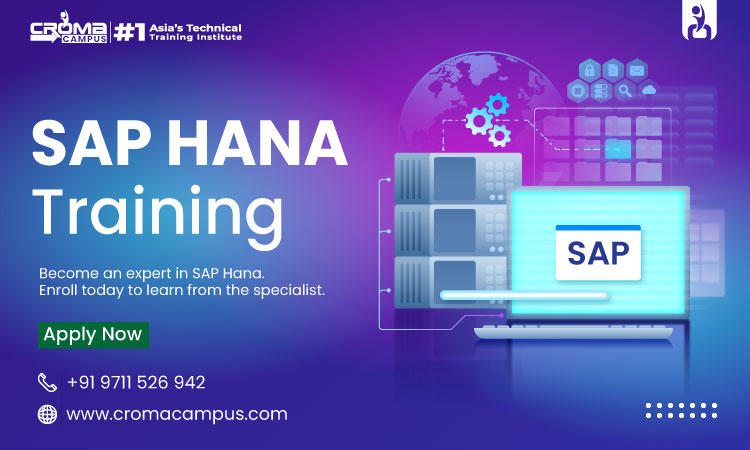Introduction
In the rapidly evolving sector of enterprise technology, SAP HANA stands out as a unique and revolutionary platform. HANA is the abbreviation for High-Performance Analytic Appliance. SAP HANA is an in-memory database and application development platform created by the German software company SAP SE. Since its development, it has gathered significant attention and adoption across various industries. As a result, SAP HANA Training grabs the attention not only of learners but also of professionals. This training provides you with skills along with certification in this technology. Moreover, they prepare you for job roles in this demanding sector as it is highly competitive. The demand for this course will rise with time. Because the distinctive features and capabilities of SAP HANA set it apart from other database and application platforms.
Features of SAP HANA
In-Memory Computing
The most striking feature of SAP HANA is its in-memory computing capability. Unlike traditional databases that store data on disk, SAP HANA stores data in RAM (Random Access Memory). Hence, it means that data can be accessed and processed at lightning speed. Moreover, in-memory computing eliminates the need to recover data from slow disk storage. Hence, resulting in significant performance improvements for data-intensive operations. As a result, businesses can analyze large datasets in real-time, and make faster decisions. And react quickly to changing market conditions.
Real-Time Analytics
SAP HANA’s in-memory architecture enables real-time analytics, a capability that is particularly valuable in today’s fast-paced business environment. Since traditional databases, running complex analytics queries could take hours or even days. But SAP HANA, allows businesses to perform complex analytical tasks in real-time. This real-time insight empowers organizations to make data-driven decisions quickly, enhance business processes, and gain a competitive edge.
Advanced-Data Processing
SAP HANA goes beyond traditional data processing capabilities. It supports a wide range of data processing techniques. Such as OLAP (Online Analytical Processing), OLTP (Online Transaction Processing), and advanced analytical processing. Hence, this versatility makes it a suitable platform for both transactional and analytical workloads. Moreover, businesses can reduce their workloads onto a single platform. Thus, it simplifies their IT landscape and reduces operational costs.
Geospatial Processing
SAP HANA excels in geospatial processing which makes it an ideal choice for businesses that deal with location-based data. Further, it can handle complex geospatial data types and perform spatial analysis with ease. Therefore, this capability is particularly valuable for industries such as logistics, transportation, and retail, where location plays an essential role in decision-making.
Data Integration and Transformation
Data integration is a crucial aspect of any modern enterprise, and SAP HANA simplifies this process. Because it offers powerful data integration capabilities that allow organizations to connect to various data sources. Such as structured and unstructured data, and integrate them seamlessly. Moreover, SAP HANA provides powerful data transformation capabilities. Thus, it enables businesses to purify, improve, and transform data before it is loaded into the system. Hence, it ensures that the data is accurate, uniform, and ready for analysis.
Simplified Application Development
Developing applications on SAP HANA is made easier with a package of development tools and a strong application server. Since SAP HANA supports multiple programming languages, including SQL, Java, Python, and more. Thus, it allows developers to select the language they are most satisfied with. Additionally, the platform provides a complete set of libraries and APIs for building custom applications, extensions, and add-ons.
Enhanced Security
Security is a major concern for businesses, especially when dealing with sensitive data. Certainly, SAP HANA includes advanced security features to protect data at rest and in transit. Furthermore, It offers encryption, authentication, and authorization mechanisms to ensure that only authorized users can access and modify data. Moreover, SAP HANA’s role-based access control allows organizations to define and execute policies that further enhance data security.
Cloud Integration
As organizations increasingly welcome cloud computing, SAP HANA offers effortless integration with cloud platforms. Therefore, businesses can utilize SAP HANA on public cloud providers like AWS, Azure, and Google Cloud. With the advantage of the scalability and flexibility the cloud offers. thus, this enables organizations to grasp the benefits of SAP HANA without the need for extensive on-premises infrastructure.
Conclusion
SAP HANA is a unique and powerful platform that has revolutionized the way businesses store, process, and analyze data. Its unique features make it stand out in the crowded field of database and application platforms. As businesses continue to depend on data-driven insights to make informed decisions. As a result, SAP HANA demand will only increase with time. Thus, a large number of people will try to learn this technology. Although, this is a course in demand its certification guarantees one with the placement. But SAP HANA Certification Cost can be a hurdle for some learners as they can’t afford it. But there are a lot of institutes that offer budget-friendly courses. Moreover, short-term courses are also available which are easy to afford. But, this would be very silly to quit this because of lack of money. SAP HANA will play a pivotal role in helping them achieve their goals and stay competitive in a rapidly changing world.

